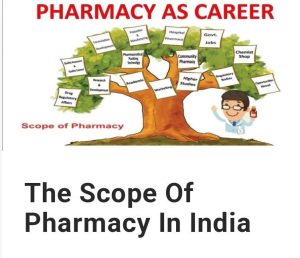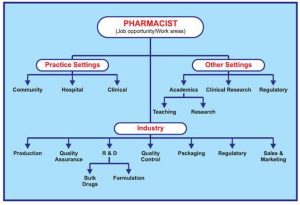In this blog, we are going to discover the good domain of a Pharmacy career in India with our complete guide. Also, find various educational routes and gain insights into the job landscape. From pursuing a Bachelor’s in Pharmacy to studying advanced degrees, this guide outlines your educational path. This navigates through possible job opportunities in retail, hospital settings, and pharmaceutical industries. It explores the dynamic field of research and development, by witnessing the growth opportunities in a career committed to healthcare. Hence, it releases your potential in the pharmaceutical sector, where your skills and knowledge contribute to the well-being of society and adopt a fulfilling journey with this guide, going on the path to a successful Pharmacy career in India.
Career Scope of Pharmacy in India: Complete Guide
The field of pharmacy in India holds considerable importance in the domain of healthcare, playing a key role in providing the well-being of the population. This guide aims to clear all the doubts about the career scope within the pharmacy sector, offering a complete overview.

Introduction
In India, the pharmacy sector stands as an important pillar in the healthcare ecosystem. With a growing focus on health and wellness, the demand for skilled pharmacy experts is on the pitch. The pharmacists, as crucial members of the healthcare system, contribute to patient care by dispensing medicines, providing practical drug-related information, and promoting safe and effective medication use.
The pharmacy landscape in India contains various factors, including retail and hospital pharmacies, pharmaceutical manufacturing, research and development, regulatory affairs, and academia. The sector’s life opens doors for various career paths, attracting individuals with a passion for science and a commitment to public health.
As the healthcare industry continues to evolve, pharmacists find themselves at various, actively participating in patient care, drug discovery, and healing innovations. The significance of pharmacy education and practice is highlighted by its direct impact on improving healthcare outcomes and ensuring the safe and rational use of medications.
This information goes deeper information into the multiple career opportunities within the pharmacy domain, providing valuable insights for those aspiring to launch on a fulfilling and impactful journey in the field. Hence, the following sections aim to offer a complete understanding of the career scope of pharmacy in the Indian context.
A brief overview of Pharmacy courses
The Pharmacy courses in India contain a wide range of educational programs catering to desiring pharmacists. These courses are designed to provide students with the knowledge and skills required to work in the pharmaceutical industry, healthcare settings, research, and more. The primary pharmacy courses in India include D.Pharm (Diploma in Pharmacy), B.Pharm (Bachelor of Pharmacy), M.Pharm (Master of Pharmacy), and Pharm.D (Doctor of Pharmacy).

Diploma in Pharmacy (D.Pharm) is a two-year program focusing on the fundamentals of pharmaceutical science. It provides students with a foundational understanding of pharmacy practice, pharmaceutical chemistry, pharmacology, and pharmacy laws. Graduates of D.Pharm can work as pharmacy technicians or pursue higher education.
Bachelor of Pharmacy (B.Pharm) is a four-year undergraduate program that is deeper into pharmaceutical sciences. It covers subjects like medicinal chemistry, pharmacognosy, pharmaceutics, and pharmacology. B.Pharm graduates can work as pharmacists, or pharmaceutical researchers, or pursue postgraduate studies.
Master of Pharmacy (M.Pharm) is a two-year postgraduate program offering specialisations in areas such as pharmaceutics, pharmaceutical chemistry, pharmacology, pharmacognosy, and more. M.Pharm graduates often encounter advanced research, drug development, or academia.
Pharm.D (Doctor of Pharmacy) is a six-year program, including both classroom learning and clinical rotations. It contains all clinical pharmacy practice, patient care, and healthcare outcomes. Pharm.D graduates are recognised as pharmacists with advanced clinical skills and are often involved in patient-centred care.
Entrance exams play an important role in securing admission to reputed pharmacy colleges in India. Some main entrance exams include the Graduate Pharmacy Aptitude Test (GPAT), All India Manipal Entrance Test (MET), and State-level Common Entrance Tests (CETs). These exams assess candidates’ aptitude in pharmaceutical sciences and determine their eligibility for various pharmacy programs.
There are several top colleges and universities in India that offer quality pharmacy education. Institutions like the National Institute of Pharmaceutical Education and Research (NIPER), BITS Pilani, Manipal College of Pharmaceutical Sciences, and Jamia Hamdard are renowned for their pharmacy programs.
Specialisations and emerging fields in pharmacy offer students the option to focus on niche areas. Specialisations may include industrial pharmacy, clinical pharmacy, pharmaceutical analysis, regulatory affairs, and pharmacovigilance. With advancements in biotechnology and healthcare, emerging fields like personalised medicine, pharmacogenomics, and digital health in pharmacy are gaining importance. Hence, opening up new career avenues for pharmacy professionals.
Scope of Pharmacy In India
India is one of the world’s largest pharmaceutical industries, offering large opportunities for pharmacy studies. The scope stretches beyond national borders, providing career options worldwide. Research and Development (R&D) is a key sector, where professionals confront new drug development, formulation, and toxicological studies using refined equipment. High demand exists for skilled researchers and technicians with advanced degrees, such as M. Pharm or PhD. Hence, various career paths, from hospital and community pharmacists to drug inspectors, await pharmaceutical graduates, reflecting the industry’s diversity.

Employment Scenario
The pharmacy graduates find great career opportunities in hospitals, both private and government, as well as in research labs and the industry. Their roles include drug procurement, stocking, preparation, and dispensing. Additionally, hospital pharmacists monitor drug use, composition, and effects, suggesting medical staff on medicine selection and side effects. In the pharmaceutical industry, pharmacists contribute to drug formulation and manufacturing based on their research.
Low cost of production is an attraction
India’s pharmaceutical industry helps in benefits from significantly lower production costs compared to the US. The cost of medicine production is approximately 33% less, labour costs are 50–55% cheaper, and setting up a production plant costs 40% less in India. Therefore, India stands out as the leading global provider of generic drugs, with Indian generics constituting 20% of global exports. These cost advantages make pursuing a pharmaceutical degree in India an adorable choice for a good career.
Career Opportunities available in Pharmacy in India
In India, the field of pharmacy offers various and good career opportunities. Here’s an overview of some key roles along with their average salaries:
- Drug Inspector: It provides drug safety and keeping with regulations, drug inspectors play an important role. Average salary: INR 4-6 lakhs per annum.
- Production Executive: Here managing pharmaceutical manufacturing processes, production executives contribute to the industry’s growth. Average salary: INR 3-5 lakhs per annum.
- Clinical Research Associate (CRA): In the field of research, CRAs oversee clinical trials and experiments. Average salary: INR 3.5-5.5 lakhs per annum.
- Pharmacist: Dispensing medicines and providing healthcare advice, pharmacists are essential in retail and hospital settings. Average annual salary: INR 2-4 lakhs.
- Regulatory Affairs Manager: Providing observation with regulations, these professionals navigate complex regulatory landscapes. Average salary: INR 5-8 lakhs per annum.
- Quality Control Executive: Here we maintain product quality, these experts ensure pharmaceuticals meet strict standards. Average salary: INR 3.5-6 lakhs per annum.
- Medical Writer: The person crafting documents for regulatory submissions or educational materials, medical writers earn around INR 4-6 lakhs per annum.
These figures may vary based on factors such as experience, location, and employer, making the pharmaceutical industry an attractive and dynamic field for career growth in India.

Conclusion
In ending, the pharmacy profession in India holds huge significance, offering extended opportunities for those passionate about healthcare. Pharmacists play a key role in ensuring public health by dispensing medications, providing valuable advice, and contributing to research. The desiring pharmacists are inspired to pursue their careers with determined passion and dedication. This profession not only contributes to personal growth but also serves the crucial mission of enhancing the well-being of individuals and communities. Therefore, the pharmacy field in India is dynamic, and promising, and holds the potential for fulfilling and impactful careers for those committed to making a positive difference in healthcare.
FAQs (Frequently Asked Questions)
- What is the minimum qualification required to pursue a career in pharmacy in India?
The minimum qualification to pursue a career in pharmacy in India is a Bachelor’s degree in Pharmacy (B.Pharm), which typically requires completion of 10+2 with science subjects.
- How can I become a registered pharmacist in India?
To become a registered pharmacist in India, one needs to complete a Bachelor’s in Pharmacy, undergo practical training, and register with the State Pharmacy Council after passing the licensing examination.
- Is it worth doing an M.Pharm in India?
Pursuing an M.Pharm in India is considered worthwhile as it provides advanced knowledge, specialisation, and potential career advancement in the pharmaceutical industry, research, or academia.
- What is the difference between a Pharm.D and a B.Pharm?
Pharm.D vs. B.Pharm:
Pharm.D is a clinical doctorate in pharmacy, focusing on patient care, while B. Pharm is a bachelor’s degree centred on pharmaceutical sciences and industry aspects.